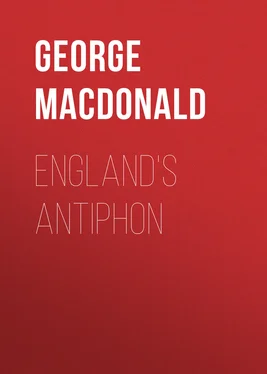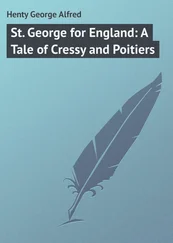George MacDonald - England's Antiphon
Здесь есть возможность читать онлайн «George MacDonald - England's Antiphon» — ознакомительный отрывок электронной книги совершенно бесплатно, а после прочтения отрывка купить полную версию. В некоторых случаях можно слушать аудио, скачать через торрент в формате fb2 и присутствует краткое содержание. Издательство: Иностранный паблик, Жанр: foreign_poetry, Поэзия, foreign_antique, foreign_prose, на английском языке. Описание произведения, (предисловие) а так же отзывы посетителей доступны на портале библиотеки ЛибКат.
- Название:England's Antiphon
- Автор:
- Издательство:Иностранный паблик
- Жанр:
- Год:неизвестен
- ISBN:нет данных
- Рейтинг книги:3 / 5. Голосов: 1
-
Избранное:Добавить в избранное
- Отзывы:
-
Ваша оценка:
- 60
- 1
- 2
- 3
- 4
- 5
England's Antiphon: краткое содержание, описание и аннотация
Предлагаем к чтению аннотацию, описание, краткое содержание или предисловие (зависит от того, что написал сам автор книги «England's Antiphon»). Если вы не нашли необходимую информацию о книге — напишите в комментариях, мы постараемся отыскать её.
England's Antiphon — читать онлайн ознакомительный отрывок
Ниже представлен текст книги, разбитый по страницам. Система сохранения места последней прочитанной страницы, позволяет с удобством читать онлайн бесплатно книгу «England's Antiphon», без необходимости каждый раз заново искать на чём Вы остановились. Поставьте закладку, и сможете в любой момент перейти на страницу, на которой закончили чтение.
Интервал:
Закладка:
Jesus, for the deadly tears
That thou sheddest for my guilt,
Hear and speed my prayérs
And spare me that I be not spilt;
the best that is in the suppliant shines out thus
Jesu, for them I thee beseech
That wrathen thee in any wise;
Withhold from them thy hand of wreche, vengeance.
And let them live in thy service.
Jesu, most comfort for to see
Of thy saintis every one,
Comfort them that careful be,
And help them that be woe-begone.
Jesu, keep them that be good,
And amend them that have grieved thee;
And send them fruits of earthly food,
As each man needeth in his degree.
Jesu, that art, withouten lees, lies.
Almighty God in trinity,
Cease these wars, and send us peace,
With lasting love and charity.
Jesu, that art the ghostly stone spiritual.
Of all holy church in middle-erde, the world.
Bring thy folds and flocks in one,
And rule them rightly with one herd.
We now approach the second revival of literature, preceded in England by the arrival of the art of printing; after which we find ourselves walking in a morning twilight, knowing something of the authors as well as of their work.
I have little more to offer from this century. There are a few religious poems by John Skelton, who was tutor to Henry VIII. But such poetry, though he was a clergyman, was not much in Skelton's manner of mind. We have far better of a similar sort already.
A new sort of dramatic representation had by this time greatly encroached upon the old Miracle Plays. The fresh growth was called Morals or Moral Plays. In them we see the losing victory of invention over the imagination that works with given facts. No doubt in the Moral Plays there is more exercise of intellect as well as of ingenuity; for they consist of metaphysical facts turned into individual existences by personification, and their relations then dramatized by allegory. But their poetry is greatly inferior both in character and execution to that of the Miracles. They have a religious tendency, as everything moral must have, and sometimes they go even farther, as in one, for instance, called The Castle of Perseverance , in which we have all the cardinal virtues and all the cardinal sins contending for the possession of Humanum Genus , the Human Race being presented as a new-born child, who grows old and dies in the course of the play; but it was a great stride in art when human nature and human history began again to be exemplified after a simple human fashion, in the story, that is, of real men and women, instead of by allegorical personifications of the analysed and abstracted constituents of them. Allegory has her place, and a lofty one, in literature; but when her plants cover the garden and run to seed, Allegory herself is ashamed of her children: the loveliest among them are despised for the general obtrusiveness of the family. Imitation not only brings the thing imitated into disrepute, but tends to destroy what original faculty the imitator may have possessed.
CHAPTER IV
INTRODUCTION TO THE ELIZABETHAN ERA.
Poets now began to write more smoothly—not a great virtue, but indicative of a growing desire for finish, which, in any art, is a great virtue. No doubt smoothness is often confounded with, and mistaken for finish; but you might have a mirror-like polish on the surface of a statue, for instance, and yet the marble be full of inanity, or vagueness, or even vulgarity of result—irrespective altogether of its idea. The influence of Italian poetry reviving once more in the country, roused such men as Wyat and Surrey to polish the sound of their verses; but smoothness, I repeat, is not melody, and where the attention paid to the outside of the form results in flatness, and, still worse, in obscurity, as is the case with both of these poets, little is gained and much is lost.
Each has paraphrased portions of Scripture, but with results of little value; and there is nothing of a religious nature I care to quote from either, except these five lines from an epistle of Sir Thomas Wyat's:
Thyself content with that is thee assigned,
And use it well that is to thee allotted;
Then seek no more out of thyself to find
The thing that thou hast sought so long before,
For thou shalt feel it sticking in thy mind.
Students of versification will allow me to remark that Sir Thomas was the first English poet, so far as I know, who used the terza rima , Dante's chief mode of rhyming: the above is too small a fragment to show that it belongs to a poem in that manner. It has never been popular in England, although to my mind it is the finest form of continuous rhyme in any language. Again, we owe his friend Surrey far more for being the first to write English blank verse, whether invented by himself or not, than for any matter he has left us in poetic shape.
This period is somewhat barren of such poetry as we want. Here is a portion of the Fifty-first Psalm, translated amongst others into English verse by John Croke, Master in Chancery, in the reign of Henry VIII.
Open my lips first to confess
My sin conceived inwardly;
And my mouth after shall express
Thy laud and praises outwardly.
If I should offer for my sin,
Or sacrifice do unto thee
Of beast or fowl, I should begin
To stir thy wrath more towards me.
Offer we must for sacrifice
A troubled mind with sorrow's smart:
Canst thou refuse? Nay, nor despise
The humble and the contrite heart.
To us of Sion that be born,
If thou thy favour wilt renew,
The broken sowle, the temple torn, threshold.
The walls and all shall be made new.
The sacrifice then shall we make
Of justice and of pure intent;
And all things else thou wilt well take
That we shall offer or present.
In the works of George Gascoigne I find one poem fit for quoting here. He is not an interesting writer, and, although his verse is very good, there is little likelihood of its ever being read more than it is now. The date of his birth is unknown, but probably he was in his teens when Surrey was beheaded in the year 1547. He is the only poet whose style reminds me of his, although the wherefore will hardly be evident from my quotation. It is equally flat, but more articulate. I need not detain my reader with remarks upon him. The fact is, I am glad to have something, if not "a cart-load of wholesome instructions," to cast into this Slough of Despond, should it be only to see it vanish. The poem is called
GASCOIGNE'S GOOD MORROW
You that have spent the silent night
In sleep and quiet rest,
And joy to see the cheerful light
That riseth in the east;
Now clear your voice, now cheer your heart;
Come help me now to sing;
Each willing wight come bear a part,
To praise the heavenly King.
And you whom care in prison keeps,
Or sickness doth suppress,
Or secret sorrow breaks your sleeps,
Or dolours do distress;
Yet bear a part in doleful wise;
Yea, think it good accord,
And acceptable sacrifice,
Each sprite to praise the Lord.
The dreadful night with darksomeness
Had overspread the light,
And sluggish sleep with drowsiness
Had overpressed our might:
A glass wherein you may behold
Each storm that stops our breath,
Our bed the grave, our clothes like mould,
And sleep like dreadful death.
Интервал:
Закладка:
Похожие книги на «England's Antiphon»
Представляем Вашему вниманию похожие книги на «England's Antiphon» списком для выбора. Мы отобрали схожую по названию и смыслу литературу в надежде предоставить читателям больше вариантов отыскать новые, интересные, ещё непрочитанные произведения.
Обсуждение, отзывы о книге «England's Antiphon» и просто собственные мнения читателей. Оставьте ваши комментарии, напишите, что Вы думаете о произведении, его смысле или главных героях. Укажите что конкретно понравилось, а что нет, и почему Вы так считаете.












